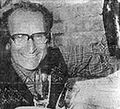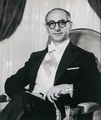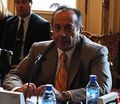جامعة بوينس أيرس
Universidad de Buenos Aires | |
 | |
| الشعار | Argentum virtus robur et studium (Latin) |
|---|---|
الشعار بالإنجليزية | Argentine virtue is strength and study |
| النوع | Public |
| تأسست | 1821 |
| الميزانية | US$700 million (2015)[1] |
| القيّم | Dr. Alberto Barbieri |
| الطاقم الأكاديمي | 28,943 (2004)[2] |
| الطلبة | 311,175 (2004)[3] |
| طلبة قبل البكالوريوس | 297,639 (2004) |
| طلاب الدراسات العليا | 13,536 (2004) |
| الموقع | ، |
| الحرم | Urban |
| ألوان المدرسة | |
| الموقع الإلكتروني | www.uba.ar |
The University of Buenos Aires (إسپانية: Universidad de Buenos Aires, UBA) is the largest university in Argentina and the second largest university by enrollment in Latin America. Founded on August 12, 1821 in the city of Buenos Aires, it consists of 13 departments, 6 hospitals, 10 museums and is linked to 4 high schools: Colegio Nacional de Buenos Aires, Escuela Superior de Comercio Carlos Pellegrini, Instituto Libre de Segunda Enseñanza and Escuela de Educación Técnica Profesional en Producción Agropecuaria y Agroalimentaria.
Entry to any of the available programmes of study in the university is open to anyone with a secondary school degree; in most cases, students who have successfully completed high school must pass a first year called CBC, which stands for Ciclo Básico Común (Common Basic Cycle). Only upon completion of this first year may the student enter the chosen school; until then, they must attend courses in different buildings, and have up to 3 years to finish the 6 or 7 subjects (which vary depending on the programme of study chosen) assigned in two groups of 3 or 4. Each subject is of one semester duration (March–July or August–November). If someone passes all 6 subjects in their respective semester, the CBC will take only one year. Potential students of economics, instead, take a 2-year common cycle, the "CBG" (General Basic Cycle), comprising 12 subjects.
The UBA has no central campus. A centralized Ciudad Universitaria (literally, "university city") was started in the 1960s, but contains only two schools, with the others at different locations in Buenos Aires.
Access to the university is free of charge for everyone, including foreigners. However, the postgraduate programs charge tuition fees that can be covered with research scholarships for those students with outstanding academic performance.
The university has produced four Nobel Prize laureates, one of the most prolific institutions in the Spanish-speaking world. According to the QS World University Rankings (2017/18) the University of Buenos Aires ranked number 75 in the world.[4]
Rankings
| ترتيبات الجامعة | |
|---|---|
| العالمي | |
| الترتيب الأكاديمي[5] | 151-200 category |
| كيو إس[6] | 75 |
| أمريكا اللاتينية | |
| كيو إس[8] | 11 [7] |
ا
There are no existing Argentinian or Latin-American university ranking systems, but several international rankings have ranked the University of Buenos Aires (UBA). The reputed Academic Ranking of World Universities (ARWU), also known as the Shanghai Ranking ranked UBA not only above all other Argentinian universities but all other Latin-American ones.[9] The QS World University Rankings ranks UBA in the 75th place, above all other Spanish or Portuguese speaking universities (American and European) in its worldwide ranking [4] but relegates it to the 11th place in its Latin-American ranking.[7]
Notable alumni
- Che Guevara, revolutionary leader and physican
- Viviana Alder, marine microbiologist, Argentine Antarctic researcher
- Esther Hermitte, anthropologist
- Alejandro Bulgheroni, oil billionaire[10]
- Juan Cabral, film director
- Alberto Prebisch, architect
- Raul Prebisch, economist
- Teresa Ratto, physician
- Luis Agote, physician
- Jose Pedro Montero De Candia, 27th President of Paraguay
- Salvador Maciá, physician and politician
- Inés Mónica Weinberg de Roca, lawyer, former Judge at the International Criminal Tribunal for Rwanda
- Juan Rosai, physician, Italian-born American surgical pathologist
- Luis Moreno-Ocampo, lawyer, jurist and Chief Prosecutor of the International Criminal Court
- Julio Cortázar, writer
- José Luis Murature, foreign minister of Argentina
- Richard Tomlinson, former British spy
- Rafael Viñoly, Uruguayan architect
- Diana Agrest, Argentine born American architect and theorist
- Claudio Vekstein, architect specialized in public architecture
- Clorindo Testa, architect and painter
- Patricio Pouchulu, architect and educator
- Alberto Calderón, mathematician
- Luis Caffarelli, mathematician
- Teodosio Cesar Brea, lawyer and founder of Allende & Brea
- Primarosa Chieri, geneticist
The following former students and professors of the university have received the Nobel Prize:
- Carlos Saavedra Lamas, Peace, 1936.
- Adolfo Pérez Esquivel, Peace, 1980.
- Bernardo Houssay, Physiology, 1947.
- Luis Federico Leloir, Chemistry, 1970.
- César Milstein, Medicine, 1984.
The following Presidents of Argentina have earned their degrees at the university:
- Carlos Pellegrini (1890–1892, National Autonomist Party), lawyer.
- Luis Sáenz Peña (1892–1895, National Autonomist Party), lawyer.
- Manuel Quintana (1904–1906, National Autonomist Party), lawyer.
- Roque Sáenz Peña (1910–1914, National Autonomist Party), lawyer.
- Victorino de la Plaza (1914–1916, National Autonomist Party), lawyer.
- Hipólito Yrigoyen (1916–1922 and 1928–1930, Radical Civic Union), lawyer.
- Marcelo Torcuato de Alvear (1922–1928, Radical Civic Union), lawyer.
- Agustín Pedro Justo (1932–1938, "Concordancia" alliance), engineer.
- Roberto Marcelino Ortiz (1938–1942, "Concordancia" alliance), lawyer.
- Ramón Castillo (1942–1943, "Concordancia" alliance), lawyer.
- Arturo Frondizi (1958–1962, Intransigent Radical Civic Union), lawyer.
- Arturo Umberto Illia (1963–1966, People's Radical Civic Union), physician.
- Raúl Alfonsín (1983–1989, Radical Civic Union), lawyer.
- Adolfo Rodríguez Saá (2001, Justicialist Party), lawyer.
- Eduardo Duhalde (2002–2003, Justicialist Party), lawyer.
Gallery of notable alumni
See also
- Argentine university reform of 1918
- List of Argentine universities
- Science and technology in Argentina
المراجع
- ^ University of Buenos Aires, Budget
- ^ University of Buenos Aires, 2004 Academic Staff Census
- ^ University of Buenos Aires, 2004 Student Census
- ^ أ ب "QS World University Rankings® 2018". Quacquarelli Symonds. Retrieved 20 February 2018.
- ^ "Academic Ranking of World Universities: Global". Institute of Higher Education, Shanghai Jiao Tong University. 2012. Retrieved October 7, 2012.
- ^ "QS World University Rankings". QS Quacquarelli Symonds Limited. 2012. Retrieved October 7, 2012.
- ^ أ ب "QS University Rankings: Latin America 2016". QS Quacquarelli Symonds Limited. Retrieved 8 March 2017.
- ^ "QS Latin University Rankings". QS Quacquarelli Symonds Limited. 2012. Retrieved October 7, 2012.
- ^ "Academic Ranking of World Universities 2015". Academic Ranking of World Universities 2016. ShanghaiRanking Consultancy. Retrieved 1 September 2016.
- ^ "Alejandro Pedro Bulgheroni". BusinessWeek. Retrieved 9 January 2015.
وصلات خارجية
- Official website (بالإسپانية)
- Study in Argentina: argentine government website for international students (إنگليزية)
- Pages using gadget WikiMiniAtlas
- Articles containing لاتينية-language text
- Articles using infobox university
- Articles containing إسپانية-language text
- Pages using Lang-xx templates
- Articles with hatnote templates targeting a nonexistent page
- Pages with empty portal template
- Coordinates on Wikidata
- 1821 establishments in Argentina
- Argentine national universities
- Education in Buenos Aires
- Educational institutions established in 1821
- Universities in Buenos Aires Province
- University of Buenos Aires













